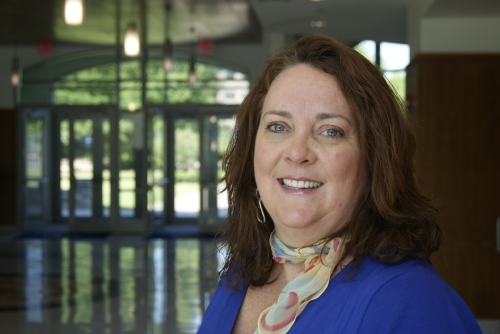DNP student receives clinical doctoral scholarship to improve coping in breast cancer patients

Coming from a “Villanova family,” oncology nurse practitioner and BSN alumna Meghan O'Regan Coleman, MSN, RN, CRNP, AOCNP, has returned to Villanova to earn her DNP in the program’s first cohort, citing the “high quality education and exceptional faculty.” That quality will translate into her DNP project promoting coping in patients with breast cancer.
In April, Meghan O'Regan Coleman, MSN, RN, CRNP, AOCNP, was selected as a recipient to receive a Clinical Doctoral Scholarship for $5,000.00 from the Oncology Nursing Society Foundation. She is a member of the inaugural cohort of the doctor of nursing practice (DNP) program at Villanova University College of Nursing who is working on her DNP project "An APN Home Care Intervention: Implementing Evidence Based Coping Mechanisms for Breast Cancer Patients."
Coleman, holds a nurse practitioner (NP) position on Penn Wissahickon Home Care and Hospice’s Cancer Longitudinal Advanced Illness Management (CLAIM) project. CLAIM is a 3-year CMS-funded study evaluating the effectiveness of a palliative care, team-based approach to caring for cancer patients still in active treatment. “Our goal is to assist in transitions of care as they progress through the cancer illness trajectory,” she offers.
Coleman was 18 when her father died after a 7-month battle with leukemia. “The nurses at the cancer center provided us a lifeline during his illness,” she notes. She then pursued nursing as her profession, starting with earning her BSN at Villanova, and ultimately practicing as an NP with oncology patients. They inspire her and teach her about courage and strength, she says.
Coleman explains that her observations over the past 14 years have led to this study. She sees that “the psychosocial needs of oncology patients are often not addressed at the time of consultation. I have also found that there is a link between psychosocial distress and an increase in emotional and physical symptoms. These symptoms can lead to delays in treatment, an increase in anxiety, and an overuse of the healthcare resources available.”
The scholarship will help reduce her own financial commitment towards earning her DNP—a degree which will further her career objective of working collaboratively in the outpatient adult oncology setting. Through education, treatment, symptom management, and palliation during the continuum of the cancer diagnosis, she aims to provide quality patient care.
Coleman’s study will propel her towards that goal as well. “It is my intention that through this DNP intervention, the patient will have enhanced coping skills to assist in adapting to this breast cancer diagnosis,” she explains, “Through education and discussion regarding coping, the patient will have an improved sense of well-being and quality of life.”
